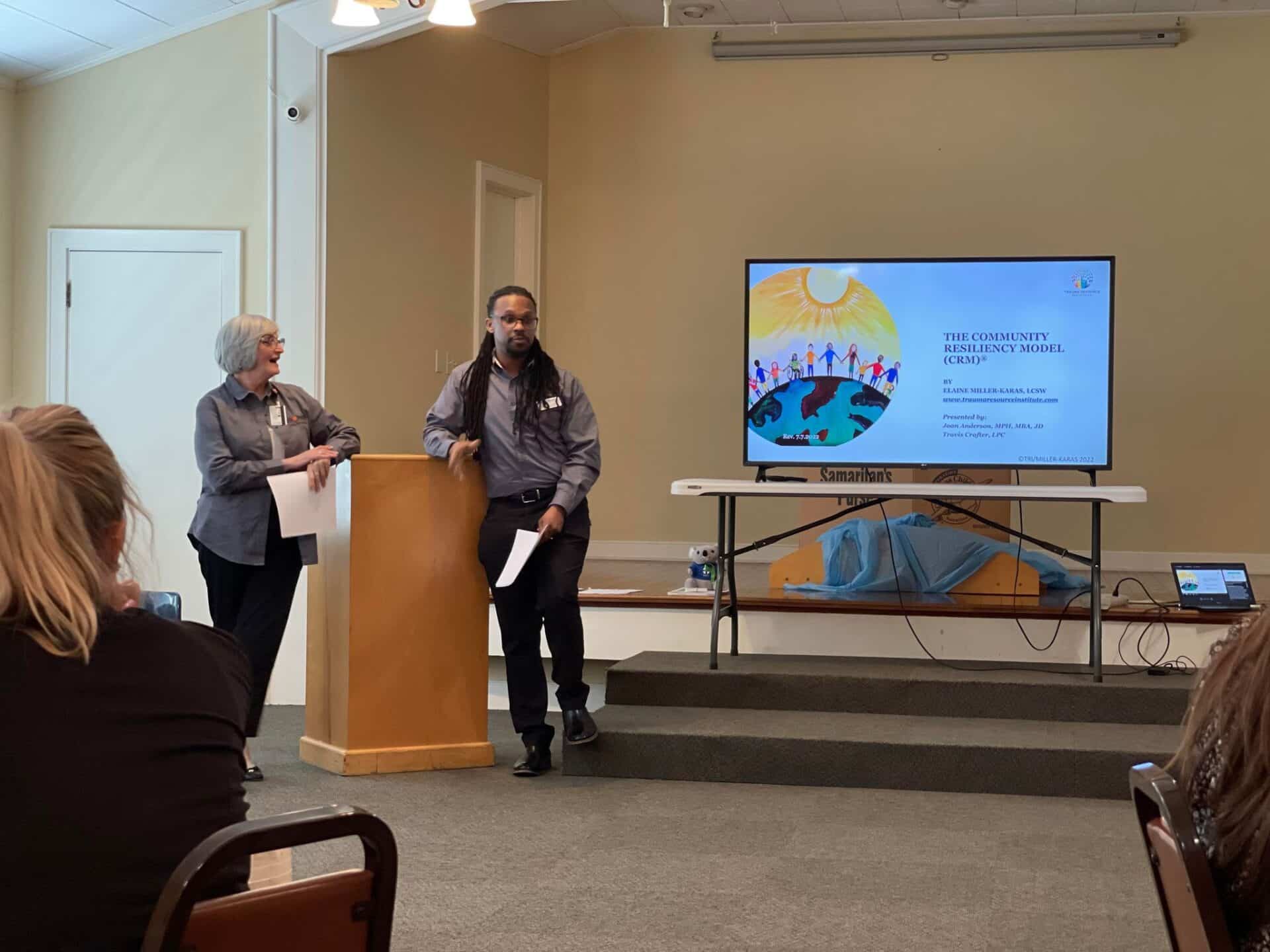
In the heart of rural communities, where close-knit bonds and shared experiences shape the fabric of daily life, the impact of trauma can be deeply felt. Whether it’s the aftermath of a natural disaster, the hidden wounds of domestic violence, or the cumulative weight of economic hardship, trauma leaves a mark on individuals and their communities. At the Georgia Rural Health Innovation Center, we understand the urgent need to address the effects of trauma and build resilience from within. By providing free community resiliency training, GRHIC is helping rural communities heal, thrive, and stand strong in the face of adversity.
The Community Resiliency Model (CRM) is a training program designed to promote individual and community resiliency by teaching individuals how to manage the effects of stress, adversity, or trauma. CRM can help build community resilience, promoting growth, well-being, and positive change by providing individuals with the tools and skills to manage challenging situations. By emphasizing the importance of self-care, positive thinking, and social support, CRM can help individuals develop sustainable and adaptable resilience, ultimately contributing to a more resilient and healthy community.
CRM was developed by Elaine Miller-Karas, LCSW, in response to the 2005 Hurricane Katrina disaster in the United States. Miller-Karas writes, “CRM is biologically based, educating the nervous system and how the body responds to stress. It is used for self-care for children, teens, and adults to stabilize emotions, resulting in more adaptive thinking when facing emotional and physical distress.”
Resiliency is an individual’s ability to adapt and recover from stress, adversity, or trauma. It is not about avoiding or eliminating challenging situations but instead navigating them to promote growth and well-being. Resilience can be built through various factors, including social support, coping skills, positive thinking, and self-care activities. Cultivating resilience can help individuals bounce back from setbacks, overcome obstacles, and thrive in adversity.
Trauma is a deeply distressing or disturbing experience that overwhelms an individual’s coping ability and impacts their physical and mental health, affecting their ability to function and enjoy life. Individual trauma can have a significant impact on community trauma. When an individual experiences trauma, it can affect their ability to function and participate in their community, which can have ripple effects. For example, an individual who has experienced trauma may struggle with symptoms such as anxiety, depression, or withdrawal, impacting their ability to work, care for their family, or engage in social activities. Addressing individual trauma is an important step in promoting community well-being and resilience. By building resilience at the individual level, communities can become more connected, supported, and better equipped to face challenges and overcome obstacles. Additionally, resilient communities are better equipped to prevent and respond to crises, which can help mitigate the impacts of disasters and other negative events.
The Georgia Rural Health Innovation Center provides free CRM training sessions to support rural communities, delivered virtually or in-person to communities in Georgia. Participants learn skills and tools to manage the effects of stress, adversity, or trauma in their own lives. The skills include tracking sensations in the body, resourcing, grounding, soothing, shifting, and connecting. CRM is a simple and effective approach that has been proven to promote healing and resilience in the aftermath of trauma for those who work directly with trauma survivors or simply want to learn how to support their community.
The ideal audience for GRHIC-led training is
- Health care providers: Doctors, nurses, and other healthcare professionals often face highly stressful and traumatic situations, such as dealing with critically ill or injured patients, witnessing patient deaths, and working long and unpredictable hours. Learning to manage stress and overcome trauma can help medical professionals reduce the negative effects of such experiences, prevent burnout, and maintain their physical and mental well-being. It can also improve their ability to provide high-quality patient care and promote positive patient outcomes.
- First responders: First responders are frequently exposed to high-stress situations that can lead to burnout, secondary traumatic stress, and other mental health challenges. By learning how to manage stress and overcome trauma, first responders can develop the resilience and coping skills necessary to stay healthy and effective on the job. This can lead to better decision-making, improved teamwork, and a more positive work environment. First responders who have received training in stress management and trauma recovery may be better equipped to provide compassionate care to individuals who have experienced traumatic events.
- Educators: Teachers, school counselors, and other educational professionals face a range of stressful situations in their daily work, including managing difficult student behavior, meeting academic expectations, and dealing with administrative duties. They may also face traumatic situations, such as supporting students who have experienced abuse or violence. Learning to manage stress and overcome trauma can help teachers maintain their mental and emotional well-being, which is critical for effectively supporting students and creating a positive classroom environment. It can also help teachers build resilience and develop coping strategies to deal with challenging situations they may encounter.
- Community members: Community leaders and members can face a variety of stressful and traumatic situations, such as natural disasters, violent crimes, or the increased stressors of life. Learning to manage stress and trauma can help community members cope with the impact of these events on their mental and physical well-being. This includes building resilience, developing coping mechanisms, and seeking support from others. By addressing the mental health needs of individuals, communities can promote overall well-being and improve social connectedness, which can lead to a more resilient and supportive community.
If you want to learn more about the Community Resiliency Model or host a training session, contact Travis Crafter at crafter_tj@georgiaruralhealth.org. Together, we can support individuals and communities to build a stronger foundation for well-being and resilience.
